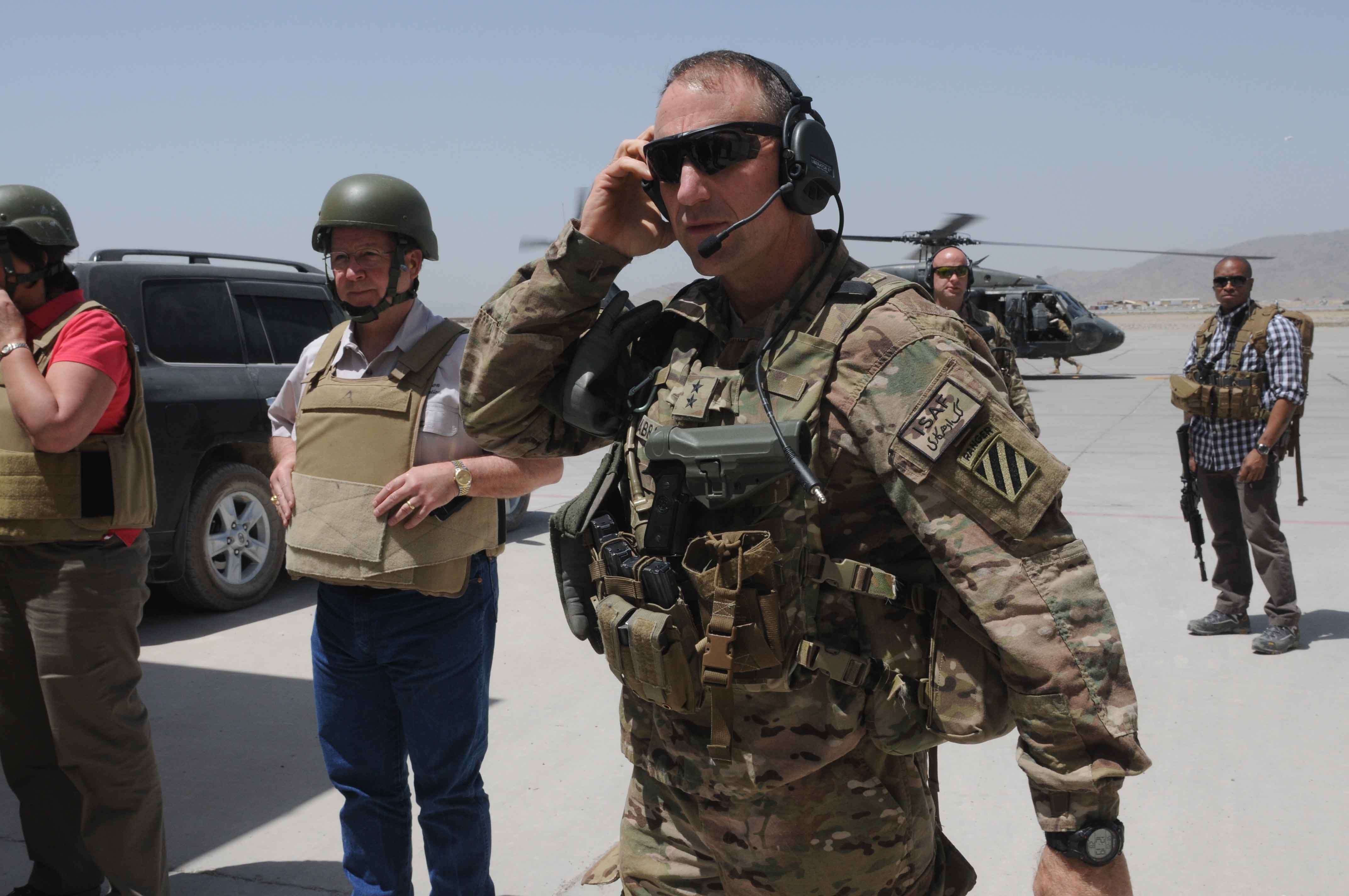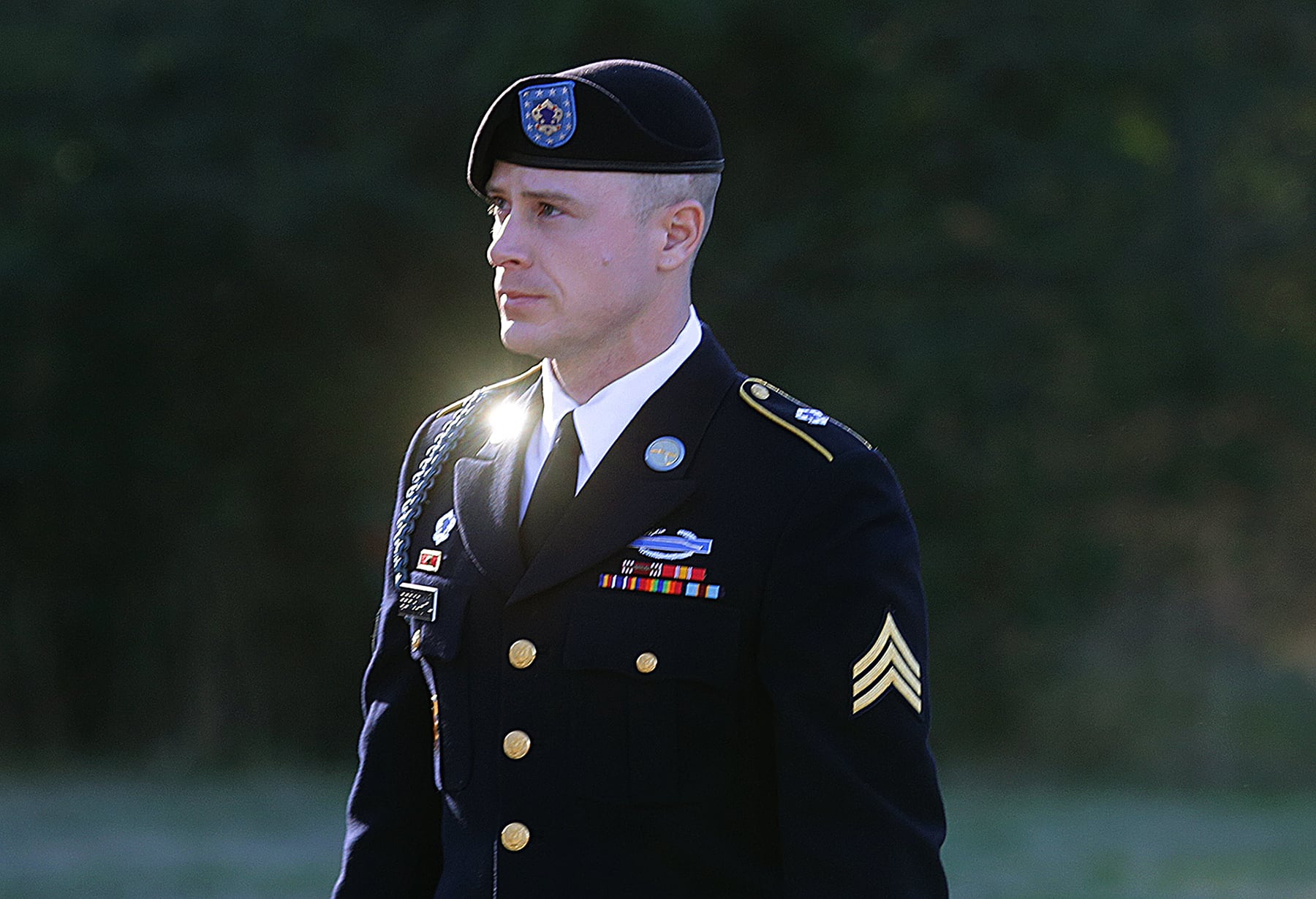In an ongoing back and forth, prosecutors in the case against Sgt. Bowe Bergdahl roundly rejected a defense petition to have Gen. Robert Abrams removed from the case, calling the request "not supported by the facts" and having "little to no legal authority."
Abrams, in an affidavit included with the prosecution's response, also rejected the defense's claims, writing "all decisions made by me as commander [of Forces Command] and the general court-martial convening authority were within my sole discretion, based on the material submitted to me. My decisions were not impacted by any outside influence and are mine alone."
Bergdahl's lawyers on Aug. 12 filed a motion calling for Abrams, the commanding general of Forces Command, to be disqualified as the general court-martial convening authority because of his "substantial prior involvement" in the case.
The motion also states Abrams referred charges against Bergdahl "without considering defense objections to and comments on the report of the preliminary hearing officer," and burned letters of support he received that would have been "evidence favorable to the defense."
In addition to disqualifying Abrams as the convening authority, the motion also asks that the charges against Bergdahl be dropped. And if any charges are "re-referred" against Bergdahl, he should not face any punishment if he's found guilty, according to the motion.
In their response, filed Friday, prosecutors said the defense claim that Abrams, who served as the senior military assistant to then-Defense Secretary Chuck Hagel, had "substantial prior involvement" in the case is "baseless."
"The defense argument is essentially an attempt to conflate knowledge with involvement," prosecutors wrote in their response to the defense. "First-hand knowledge is a legal term of art with a particular meaning, and receiving information on a subject from third parties is quite literally the exact opposite. If the defense's position were correct, anyone who ever read a news article or viewed a TV report about Sgt. Bergdahl would become a 'fact witness.'"
The defense lawyers, in their motion, said Abrams "provided daily updates to the secretary, prepared and advised him regarding military matters, and attended most of his meetings."
After Bergdahl was freed, Abrams was "in charge of receiving all updates regarding his health status and the reintegration process and updating Secretary Hagel on those matters," according to the defense’s motion.
While he did serve in those key jobs, Abrams wrote in his affidavit that he was not present when Hagel was briefed on the Army’s extensive AR 15-6 investigation into the Bergdahl case.
"I did not participate in any way in this matter prior to taking command of FORSCOM," Abrams wrote, adding that he reviewed the entire investigation after taking command.
Bergdahl’s lawyers also said Abrams did not consider their "timely objections to and other comments" on the report from Bergdahl’s Article 32 hearing.
In his affidavit, Abrams said he read the objections "several times and consulted with my Staff Judge Advocate to gain a better understanding of the defense concerns."
The Article 32 took place Sept. 17-18 at Fort Sam Houston and was conducted by Lt. Col. Mark Visger.
Visger recommended the case be referred to "a special court-martial not authorized to adjudge a punitive discharge and that Sgt. Bergdahl not receive any jail time," according to the motion.
The defense submitted four pages of objections and comments on Visger’s report, according to the motion.
In addition to reviewing the defense’s objections, Abrams also reviewed a memo from the preliminary hearing officer that included additional defense objections, prosecutors wrote.
"The defense’s position on this issue is internally inconsistent," the prosecutors wrote. "They claim that Gen. Abrams did not review their submission, but simultaneously claim that he was critical of the ‘style of prose’ as not being ‘plain speak.’ The fact that Gen. Abrams was able to comment on the manner in which the document was written makes it clear that he did, in fact, review it."

Then-Maj. Gen.Robert Abrams prepares to board a helicopter in Afghanistan in 2013, while he was commanding general of 3rd Infantry Division. Abrams took over Army Forces Command on Aug. 10, 2015. As FORSCOM commander, Abrams is the general court-martial convening authority in the case against Sgt. Bowe Bergdahl.
Photo Credit: Staff Sgt. Ashley Bell/Army
The government also rejected the claim that Abrams destroyed any evidence in the case, as the letters he received about the case do not qualify as evidence.
The motion from the defense had said Abrams received "over 100 letters" about the Bergdahl case; the letters were later burned.
None of the letters he received were from "anyone in the chain of command, Department of Defense, or the United States government," Abrams wrote in his affidavit. "I did not consider the letters in making any decisions regarding this case."
Abrams added that after "conducting a quick scan" of the letters as they came in, he "placed them in a burn bag. My staff regularly disposes of the contents of the bag each week."
"Gen. Abrams was under no obligation to keep, consider, or turn over unsolicited letters from strangers expressing their opinions on the disposition of the case," the prosecutors wrote.
In a second defense filing, also on Friday, Bergdahl’s lawyers rebutted the prosecution’s arguments, calling Abrams’ affidavit "self-serving" and "inconsistent in material respects with what he stated when interviewed last week in the presence of three defense attorneys and a defense paralegal."
The defense again called for Abrams to testify and characterized the burning of the letters as "prejudicial" and in violation of applicable law.
Bergdahl disappeared from Combat Outpost Mest-Lalak in Paktika province, Afghanistan, on June 30, 2009. He has been accused of leaving his patrol base alone and intentionally before he was captured by Taliban insurgents.
He spent five years as a captive under the Taliban before he was freed in a May 31, 2014, prisoner swap that also freed five Taliban leaders from the U.S. military prison at Guantanamo Bay, Cuba.
He is now assigned to a desk job at U.S. Army North at Joint Base San Antonio-Fort Sam Houston, Texas.
His court-martial is scheduled to begin Feb. 6 at Fort Bragg.
Bergdahl is charged with one count of desertion with intent to shirk important or hazardous duty, and one count of misbehavior before the enemy by endangering the safety of a command, unit or place.
The charges initially were referred against Bergdahl by Gen. Mark Milley, who was the convening authority and FORSCOM commander until he became the Army chief of staff last fall. Abrams inherited the case when he succeeded Milley at FORSCOM.
This is the second time Bergdahl’s legal team has petitioned to have a convening authority removed from the case. His lawyers called for Milley to be removed after he was nominated to lead the Army.
Michelle Tan is the editor of Army Times and Air Force Times. She has covered the military for Military Times since 2005, and has embedded with U.S. troops in Iraq, Afghanistan, Kuwait, Haiti, Gabon and the Horn of Africa.





